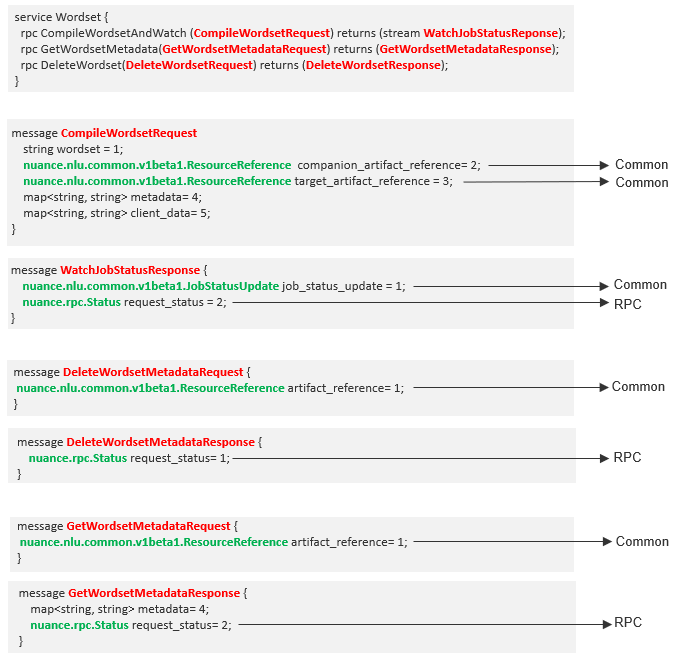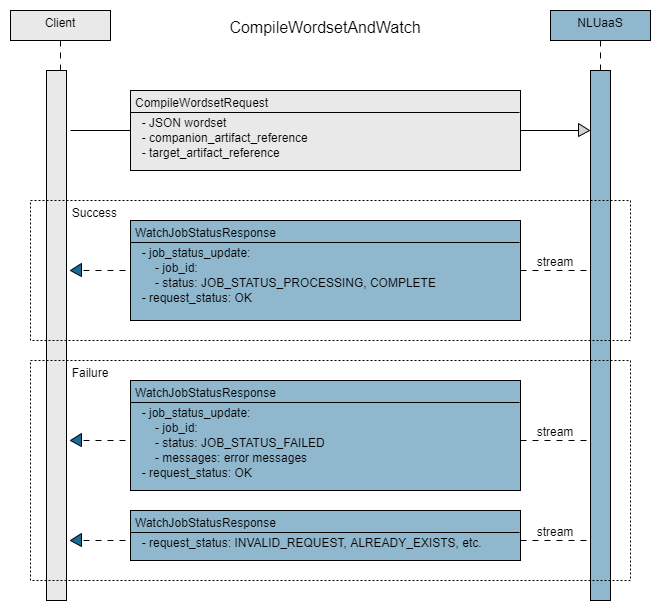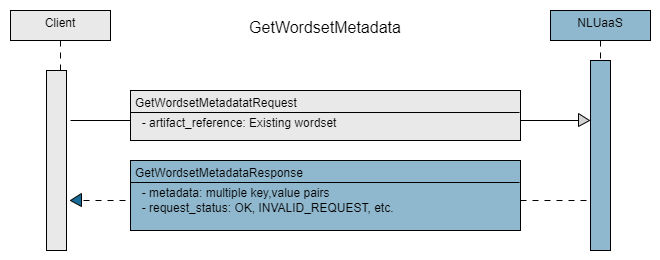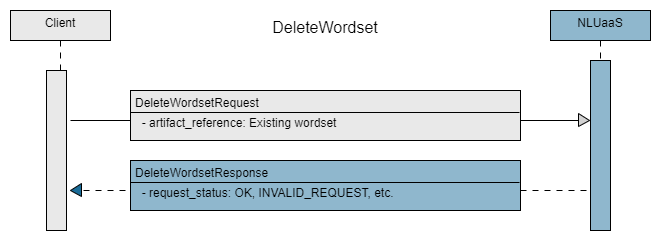Wordset service messages
The Wordset gRPC API contains methods for compiling wordsets.
Tip:
Try out this API using a Sample wordset client that you can download and run.NLU as a Service provides a set of protocol buffer (.proto) files to define a gRPC Wordset service. These files allow you to use large wordsets with your NLUaaS applications:
- nuance/nlu/wordset/v1beta1/wordset.proto contains the methods and messages needed to work with large wordsets in NLU applications.
- nuance/nlu/common/v1beta1/resource.proto and nuance/nlu/common/v1beta1/job.proto define messages for referencing external resources (NLU models and wordsets) and for job status updates.
- nuance/rpc/status.proto, nuance/rpc/status_code.proto, and nuance/rpc/error_details define messages for rpc status and error codes.
Wordset proto file structure
The file wordset.proto defines a Wordset service with several RPC methods for creating and managing wordsets.
For the nuance.nlu.common.v1beta1 messages, see Common messages.
For the nuance.rpc.Status and related messages, see RPC status messages.
Job status vs. request status
The responses in this API include two types of status updates related to the requested task:
- A Job status update refers to the condition of the job that is compiling the wordset. Its values are set in JobStatus and can be JOB_STATUS_PROCESSING, JOB_STATUS_COMPLETE, or JOB_STATUS_FAILED.
- A Request status refers to the condition of the gRPC request. Its values are set in nuance.rpc.StatusCode and can be OK, INVALID_REQUEST, NOT_FOUND, ALREADY_EXISTS, BAD_REQUEST, and so on.
Wordset service
The Wordset service offers three RPC methods to compile and manage wordsets.
| Name | Request Type | Response Type | Description |
|---|---|---|---|
| CompileWordsetAndWatch | CompileWordsetRequest | WatchJobStatusResponse stream | Submit and watch for job completion (server streaming) |
| GetWordsetMetadata | GetWordset MetadataRequest | GetWordsetMetadataResponse | Gets a compiled wordset’s metadata (unary) |
| DeleteWordset | DeleteWordsetRequest | DeleteWordset Response | Delete the compiled wordset (unary) |
CompileWordsetAndWatch
This RPC method submits a request to compile a wordset and returns streaming messages from the server until the job completes. It consists of a CompileWordsetRequest request and a WatchJobStatusResponse response.
The method submits a wordset to be compiled and starts a batch compilation job. The response is a server stream of multiple WatchJobStatusResponse job progress notifications, which continues until the end of the compilation job. This is followed by a final job status.
The WatchJobStatusResponse includes two types of notifications:
- JobStatusUpdate
- Status notifications.
The JobStatusUpdate notifications that come in the stream of WatchJobStatusUpdate messages will include the following:
- Job ID (Not used by NLUaaS. This field will always be empty.)
- One or more job status responses with JOB_STATUS_PROCESSING. The same status may be returned multiple times. Repeated notifications also keep the process alive.
- Final job status with JOB_STATUS_COMPLETE or JOB_STATUS_FAILED, or with error messages when appropriate.
The final WatchJobStatusUpdate message will include a request status. This includes a gRPC StatusCode signalling either OK for successful requests, or INVALID_REQUEST, ALREADY_EXISTS, BAD_REQUEST, and so on for unsuccessful requests. This status refers to the gRPC request itself, not the wordset compile job that was created. See Job status vs. request status.
CompileWordsetRequest
Request to compile a wordset related to a dynamic list entity.
| Field | Type | Description |
|---|---|---|
| wordset | string | Mandatory. Inline wordset JSON resource. Note: 4 MB request size limit. |
| companion_artifact_reference | nuance.nlu.common.v1beta1. ResourceReference | Mandatory. URN reference to the NLU model in which the entity is defined. |
| target_artifact_reference | nuance.nlu.common.v1beta1. ResourceReference | Mandatory. URN reference to use with the compiled wordset. The URN will later be used to reference the wordset to use it as an interpretation resource. |
| metadata | string,string | Client-supplied key,value pairs to associate with the artifact. Keys can only contain lowercase characters. |
| client_data | string,string | Client-supplied key,value pairs to inject into the logs. |
This message includes:
CompileWordsetRequest
wordset
companion_artifact_reference (nuance.nlu.common.v1beta1.ResourceReference)
target_artifact_reference (nuance.nlu.common.v1beta1.ResourceReference)
metadata
client_data
WatchJobStatusResponse
A series of these are streamed in response to a CompileWordset request. The responses provide status on both the wordset compilation job and the CompileWordsetAndWatch gRPC request.
| Field | Type | Description |
|---|---|---|
| job_status_update | nuance.nlu.common.v1beta1.JobStatusUpdate | Status of the compile wordset job. |
| request_status | nuance.rpc.Status | gRPC request status. Returned in the final streamed response. |
This message includes:
WatchJobStatusResponse
job_status_update (nuance.nlu.common.v1beta1.JobStatusUpdate)
request_status (nuance.rpc.Status)
GetWordsetMetadata
This RPC method requests and returns information about a compiled wordset. It does not return the content of the wordset. It provides two types of metadata:
-
Custom metadata, optionally supplied by the client as metadata in CompileWordsetRequest.
-
Default metadata (reserved keys):
x_nuance_companion_checksum_sha256: The companion DLM, SHA256 hash in hex format.
x_nuance_wordset_content_checksum_sha256: The source wordset content, SHA256 hash in hex format.
x_nuance_compiled_wordset_checksum_sha256: The compiled wordset, SHA256 hash in hex format.
x_nuance_compiled_wordset_last_update: Date and time of last update as ISO 8601 UTC date.
GetWordsetMetadataRequest
Request for a GetWordsetMetadata request.
| Field | Type | Description |
|---|---|---|
| artifact_reference | nuance.nlu.common.v1beta1. ResourceReference | Reference to the wordset artifact. |
This message includes:
GetWordsetMetadataRequest
artifact_reference (nuance.nlu.common.v1beta1.ResourceReference)
GetWordsetMetadataResponse
Response to a GetWordsetMetadata request.
| Field | Type | Description |
|---|---|---|
| metadata | string,string | Default and client-supplied key,value pairs. |
| request_status | nuance.rpc.Status | Indicates whether fetching of metadata was done successfully. |
This message includes:
GetWordsetMetadataResponse
metadata
request_status (nuance.rpc.Status)
DeleteWordset
This RPC method deletes a specified wordset.
DeleteWordsetRequest
Request to a DeleteWordset request.
| Field | Type | Description |
|---|---|---|
| artifact_reference | nuance.nlu.common.v1beta1. ResourceReference | Reference to the wordset artifact. |
This message includes:
DeleteWordsetRequest
artifact_reference (nuance.nlu.common.v1beta1.ResourceReference)
DeleteWordsetResponse
Response to a DeleteWordset request.
| Field | Type | Description |
|---|---|---|
| request_status | nuance.rpc.Status | Indicates whether deletion was done successfully. |
This message includes:
DeleteWordsetResponse
request_status (nuance.rpc.Status)
Scalar value types
The data types in the proto files are mapped to equivalent types in the generated client stub files.
Related topics
- NLU essentials
- Add intents and entities to your model
- Sample Python wordsets client
- Wordset app development
- Wordsets
Feedback
Was this page helpful?
Glad to hear it! Please tell us how we can improve.
Sorry to hear that. Please tell us how we can improve.



